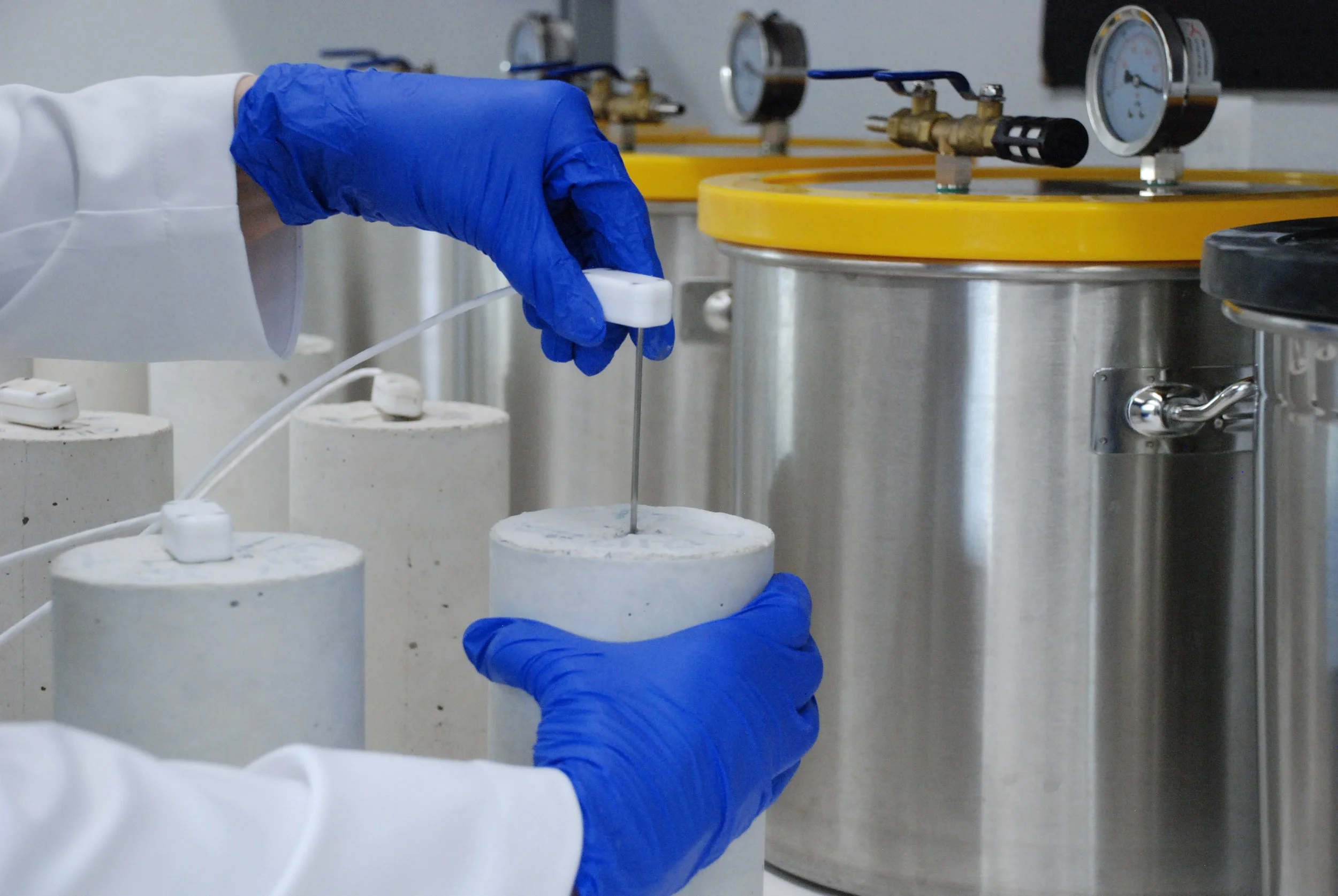
Thermal Resistivity Testing
Fast and Accurate Rho testing
Basalt Ridge offers thermal resistivity testing of soil, sand, granular materials, concrete, FTB, grout, brick, gel, paste, adhesives, and other construction materials.
Thermal Resistivity (Rho) Testing—Thermal Dryout Curve
The thermal dryout curve characterizes the thermal resistivity over the full range of water contents providing a more thorough rho assessment.
Our recommended thermal resistivity testing package for materials utilized for underground power transmission installations is the thermal dryout curve which characterizes the thermal resistivity (rho) vs. water content relationship in porous media (soil, concrete, FTB, etc.). The thermal dryout curve analysis is essential for reliable and optimal design of underground power transmission installations.
Trusted Results— Testing Conforms to ASTM D5334 or IEEE 442 Standards
All Basalt Ridge Testing Laboratory LLC thermal dryout curves conform to either ASTM D5334 or IEEE 442 standards for characterization of thermal resistivity. At Basalt Ridge Testing Laboratory LLC, our testing methodology is transparent, and all test data are provided to our clients. We use the well-accepted combination method which is the culmination of over 35 years of thermal properties research and testing. Our thermal dryout curves are the most accurate in the industry, and we provide the data to back up that claim. You can absolutely rely on our testing for you or your clients to design optimal installations.
Fast Turnaround Time
At Basalt Ridge Testing Laboratory LLC, we understand that your clients always want results yesterday, which is why our services are the fastest in the industry. However, proper thermal dryout curve generation does require that samples be fully saturated and oven-dried down, which can be slow processes, depending on sample type.
A typical 6 inch long Shelby tube soil sample requires approximately 5-7 days from the start of the process to produce the full thermal dryout curve. Samples in plastic sleeves will take significantly longer.
A thermal dryout curve on a standard 4” X 8” concrete sample requires approximately 7-8 days to complete. Samples are tested as quickly as possible in the order they are received unless an expedite is requested. We guarantee that processing of expedited samples is begun by the day following sample receipt (generally day-of receipt).
Learn about our services
-
One Measurement- Rho at the as-received water content only.
The report for simple thermal resistivity test includes the measured water content and dry bulk density (unit weight) of the sample.
We always recommend that a thermal dryout curve be generated on materials utilized for underground power transmission installations. But, we can perform simple thermal resistivity characterization of samples at the as-received water content upon request.
-
The thermal dryout curve characterizes the thermal resistivity over the full range of water contents providing a more thorough rho assessment.
-
Basalt Ridge Testing Laboratory LLC has the ability to test thermal properties of many different materials, using a variety of techniques. If you have a thermal properties characterization problem and you need help solving it, contact us and we’ll see if we can help.
FAQs
-
Thermal resistivity, rho, describes the insulating ability of a material. Thermal resistivity is the reciprocal of thermal conductivity.
-
Thermal resistivity testing of soil and concrete materials using ASTM D5334 or IEEE 442 standards require a minimum sample size of 11cm in length and 5cm in diameter.
Disturbed soil samples/backfill: 2-3 liters of material or approx. a gallon bag of material.
Concrete/FTB/Grout: 3”× 6” or 4'“× 8” cylinders are preferred.
Fluid samples require 200 mL.
-
Thermal resistivity testing with the full thermal dryout curve (our most common thermal resistivity test) generally takes 5-6 working days for soil and 7-8 days for concrete.
-
Soil, sand, granular materials, concrete, FTB, grout, brick, plastic, gel, paste, adhesives, construction materials, and solid insulation.
-
Yes, we provide thermal resistivity testing of bulk samples of disturbed soil. However, the dry density and target compaction percentage for testing must be provided.
-
ASTM D5334 and IEEE 442 standards.
We recommend ASTM D5334 because the standard allows for modern analysis techniques that are more robust and accurate.
However, many power engineers still require IEEE 442, so we can provide strict conformance to this standard as well.
-
0°C to 150°C



